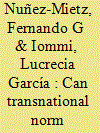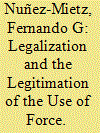| Srl | Item |
| 1 |
ID:
153925


|
|
|
|
|
| Summary/Abstract |
Norm cascades often spark resistance from states under pressure to conform. Some react by further distancing themselves from the norm—a process known as “norm backlash.” We identify a particular kind of norm backlash: the creation of legal barriers aimed at fending off a transnationally diffusing norm by blocking the ability of local actors to advocate for it. We call this phenomenon “norm immunization” and provide an account of the conditions that bring it about. In this account, transnational advocacy increases the local salience of the norm, which is discursively constructed as a national threat that calls for defensive regulations against the advocacy of the threatening norm. Using this model, we analyze Uganda’s immunization against LGBT rights as instantiated in the Anti-Homosexuality Act of 2014. We find that the successful efforts of LGBT rights advocates elsewhere indeed precipitated the discursive construction of those rights as a national threat in Uganda, thereby unintentionally contributing to the adoption of the norm-immunizing law.
|
|
|
|
|
|
|
|
|
|
|
|
|
|
|
|
| 2 |
ID:
145674


|
|
|
|
|
| Summary/Abstract |
According to rationalists and constructivists, compliance with international law occurs to the extent that states see non-compliance as unreasonable or wrong, respectively. An alternative account of compliance points to the practical difficulty of deciding to act contrary to international law. Here non-compliance is blocked rather than morally or instrumentally deterred. This article advances an organisational-process theory of this third kind. The explanatory mechanism lies in the constitutive rules of foreign policymaking, and points to the institutional function of legal advising. Under certain structural conditions (namely, lawyerised decision-making) legal advisers operate as the principal ‘agents of compliance’ within the state, bringing international law into the policymaking process and thus bridging the gap between foreign policy and legal expectations. The theory is applied to the interrogation programme implemented by the United States in the early years of the ‘War on Terror’ (2001–5). While initially violative of international legal standards, the programme eventually shifted towards compliance. Using process tracing, the case study provides fine-grained evidence that corroborates the explanatory power of organisational factors, in general, and legal advising, in particular.
|
|
|
|
|
|
|
|
|
|
|
|
|
|
|
|
| 3 |
ID:
160515


|
|
|
|
|
| Summary/Abstract |
Recent works on the role of argumentation in international politics have enriched our understanding of the discursive construction of international legitimacy. Many scholars have recognized the pervasiveness and privileged status of legal claims. Building on these insights, I advance the proposition that the international legitimacy of the use of force has legalized. Legalization implies that successful (de-)legitimation depends on the strategic use of international law, and that alternative legitimacy discourses (such as morality) have been marginalized and play a negligible role in the construction of legitimacy. Thus, the use of force is legitimate to the extent that it conforms to international law. I test this “legalization thesis” against the “hard” case of NATO's intervention in Kosovo in 1999. By revisiting the arguments used by state representatives, I show that, as expected in a legalized legitimacy system and contrary to what has become common knowledge about this case, legitimacy was gained through, not despite, international law. I analyze NATO's strategy of legitimation in detail and reconstruct it as a set of seven strategic moves, all of them appealing exclusively to the international legal discourse.
|
|
|
|
|
|
|
|
|
|
|
|
|
|
|
|